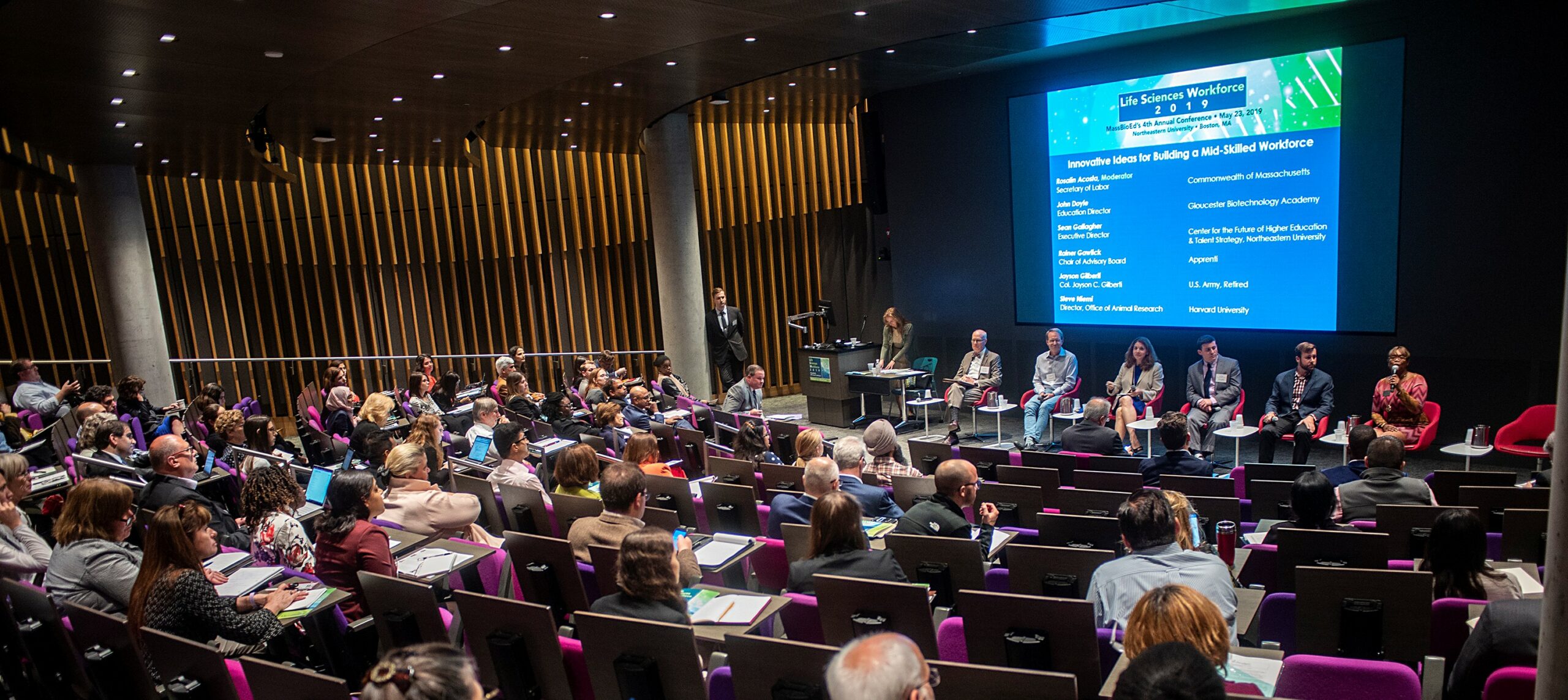
MassBioEd’s Life Sciences Workforce Conference (LSW) is the only event dedicated to bringing together leaders from all parts of higher education – from community colleges to the world’s most prestigious universities – with scientists and executives from industry – small biotechs, research institutions, big pharma, and equipment manufacturers. Our 2019 LSW was the biggest yet, with nine panel discussions, 52 speakers, and 220 attendees. The sessions focused on a wide range of disciplines, and a distinguished roster of panelists offered deep insight into several issues affecting the industry. Here is a sample of what we learned at the event.
Bioinformatics – There is a large and growing need for people with strong skillsets in biology, chemistry, programming, and statistics, and how best to accrue this disparate knowledge was the subject of debate among panelists. Answers to this question varied based on one’s function within an organization, and on the development stage of the company. Academic labs and early stage companies are more likely to explore novel problems and therefore often build custom systems for data analysis. A hiring manager may look more favorably on candidates with a talent for writing code in Python or R and rely on other scientists to supply the necessary background knowledge. As a company approaches clinical readiness, off-the-shelf software like SAS is more useful because regulatory agencies insist on standardized methods for analyzing data. In this scenario, hiring may shift in favor of computational scientists with relatively strong foundations in biology or chemistry, who are better equipped to recognize the messages concealed in the data.
Biomanufacturing – To dive into biomanufacturing, we assembled panelists with backgrounds in the manufacturing of antibodies, oligonucleotide therapeutics, viral vectors, autologous cell-transplant therapies, and analytical devices. Nevertheless, there was general agreement on the need for hiring candidates with very strong foundational skills in biology and chemistry. In fact, the need for chemists was mentioned several times – organic chemists to design oligonucleotides for gene therapy, analytical chemists to validate systems and equipment, and polymer chemists to design better plastics for single-use manufacturing. The importance of having a quality mindset was also undisputed. From assaying raw materials through final clearance of product, every manufacturing employee must have a sense of ownership and accountability. As one panelist noted, when you see an actual patient’s name on the vial, the need for assured excellence becomes very real.
Immigration – About 30% of the life sciences workforce in Massachusetts is foreign born, heightening the significance and impact of immigration policies on our talent pool. The panelists’ take-home messages were clear: Over the past few years, the difficulty and the time required to process applications has increased substantially. Requests for additional evidence of employer need – wherein employers must prove they need the foreign-born candidate and no U.S. citizen can do the same job as well – have more than doubled, and denials of applications have multiplied. For smaller companies with limited human resources staff, it’s vital to engage an experienced immigration attorney to ensure that non-citizen employees are aware of the time and documentation necessary to retain legal status.
Building a Mid-Skilled Workforce – Discussion around workforce development dealt with ways to grow our local talent pool and encourage employers to seek out candidates who may not be familiar with this industry. Specifically, for mid-skilled work – scientific support, manufacturing operations, or facility and equipment maintenance – there are many people with the right attitude and aptitude who don’t know how to get a foothold in this industry. To bridge this gap, our panelists presented ideas on hiring veterans, developing apprenticeship programs, and designing stackable certifications similar to those widely used in lab animal care and in the high-tech industry.
LSW hosted several panelists on a variety of subjects, but one theme reigned supreme: Supply < Demand. Technical leaders discussed the specific skills they are looking for when hiring new college graduates to help educators enhance their curricula and provide students with experience in these techniques; and hiring managers talked of the importance of “soft skills” in choosing one candidate over another. However, differences in corporate cultures can skew the relative value of some attributes. Hiring candidates who “fit” may be helpful when building a team, but this may also lead to the exclusion of candidates or dampen the upward mobility of employees who don’t fit into the same mold as the current leaders.
As an industry, we must focus our efforts on expanding students’ awareness of the vast opportunities the life sciences has to offer to increase the number of candidates, and the potential, of our future talent pool. To ensure college and graduate students are informed of the multitude of professional occupations open to them, we heard from several colleges who are instituting innovative programs to improve alignment of students’ education and interest with the kinds of professional opportunities that are available.
So, what did we learn? Certainly, the state of this industry is very strong, and continues to grow. But, with such a tight market for new talent, maintaining this industry will take teamwork. Industry and academia must work as partners to ensure the viability of the next generation of workers. The team at MassBioEd looks forward to continuing our mission to build bridges and foster communication between educators and employers to help sustain the incredible advances being made in our life sciences industry.
For more information on careers in the life sciences and to review the latest salary data, be sure to check out MassBioEd’s BioWages Guide 2019.